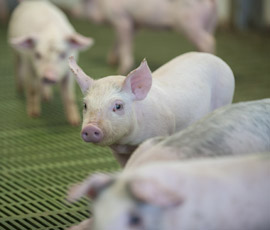New project aims to end pig tail docking in EU

Researchers have been granted €2.5m to find ways to eliminate the need to tail dock pigs.
The new FareWellDock project will aim to develop better early warning tools and suitable environmental enrichment to decrease the tail biting risk.
Tail docking is considered necessary by most pig farmers to reduce the risk of tail biting, which causes pain to the animal. However, many animal welfare scientists believe tail docking is a painful procedure and should be avoided. The ultimate aim of the project is to develop a non-docking policy in the EU.
Dale Sandercock, a researcher at Scotland’s Rural College, said: “We believe it is important we do something to change this system. While the pigs find it painful being tail bitten, there may be other ways to reduce this behaviour without having to resort to removing part of the tail. This study will hopefully provide solutions for farmers who want to avoid docking but worry about tail biting increasing as a result.”
Several factors can increase the risk of tail biting, including health problems, delayed detection of a tail biting outbreak and lack of environmental enrichment. All of these areas will be studied with particular emphasis on environment enrichment using straw, which has been said to reduce the incidence of tail biting.
As part of the project, researchers at Newcastle University will be looking at developing and validating a system that uses facial expressions to assess the level of pain pigs are experiencing.
Read more about the tail docking debate
